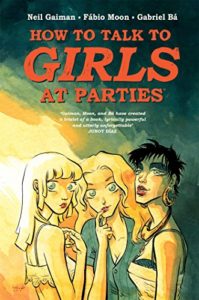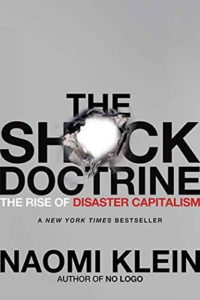How to Talk to Girls at Parties – Neil Gaiman, ilustrações de Fábio Moon e Gabriel Bá
Eu não sou muuuito de quadrinhos, mas esse foi uma sugestão dada no primeiro podcast que gravei ever, esse Jah! (que nem existe mais, virou tudo EPEP) aqui. Gostei, mas não ameeeeei não. É uma história bem estranha e surpreendente, bem estilo Gaiman. As ilustrações são lindíssimas. Leitura divertida, rapidinha.
The Shock Doctrine – Naomi Klein
Cara. Esse livro me deu um ódio, mas um ódio, MAS UM ÓDIO que puta merda. Li quase até a metade no avião voltando de Orlando, então imaginem a minha raiva com todo aquele canavial de capitalismo que eu tinha acabado de experimentar (em tempo: adoro a Disney, mas com parcimônia. MEJOOLGUEM)
Foi difícil escolher um trecho pra colocar aqui; dei highlight em uma cacetada de pedaços. A coisa toda me irritou tanto que larguei na metade. Pretendo ler o resto em 2019, pra alimentar mais ainda a minha raiva contra esse governo que está por vir.
“It all came back to Friedman’s single-minded message: everything went wrong with the New Deal. That’s when so many countries ‘including my own, got off on the wrong track.’ To get governments back on the right track, Friedman, in his first popular book, Capitalism and Freedom, laid out what would become the global free-market rulebook and, in the U.S., would form the economic agenda of the neoconservative movement.
First, governments must remove all rules and regulations standing in the way of the accumulation of profits. Second, they should sell off any assets they own that corporations could be running at a profit. And third, they should dramatically cut back funding of social programs. Within the three-part formula of deregulation, privatization and cutbacks, Friedman had plenty of specifics. Taxes, when they must exist, should be low, and rich and poor should be taxed at the same flat rate. Corporations should be free to sell their products anywhere in the world, and governments should make no effort to protect local industries or local ownership. All prices, including the price of labor, should be determined by the market. There should be no minimum wage. For privatization, Friedman offered up health care, the post office, education, retirement pensions, even national parks. In short, and quite unabashedly, he was calling for the breaking of the New Deal – that uneasy truce between the state, corporations and labor that had prevented popular revolt after the Great Depression. Whatever protections workers had managed to win, whatever services the state now provided to soften the edges of the market, the Chicago Schools counterrevolution wanted them back.
And it wanted more than that – it wanted to expropriate what workers and governments had built during those decades of frenetic public works. The assets that Friedman urged government to sell were the end products of the years of investment of public money and know-how that had built them and made them valuable. As far as Friedman was concerned, all this shared wealth should be transferred into private hands, on principle.”
Sabe quem segue os conceitos da Chicago School? Nosso futuro ministro da economia. Sabe todos esses direitos que temos hoje, todo esse patrimônio nacional? Vão sumir.
Quem mandou eleger o Grandíssimo Saco de Merda? Sifudê. Que ódio desgraçado que esse livro me deu, puta que pariu. A gente avisou, todo mundo que entende de história e economia avisou, E VOCÊS DESGRAÇADOS ELEGERAM ESSE BOSTA. Tomanocu seus minions idiotas.


